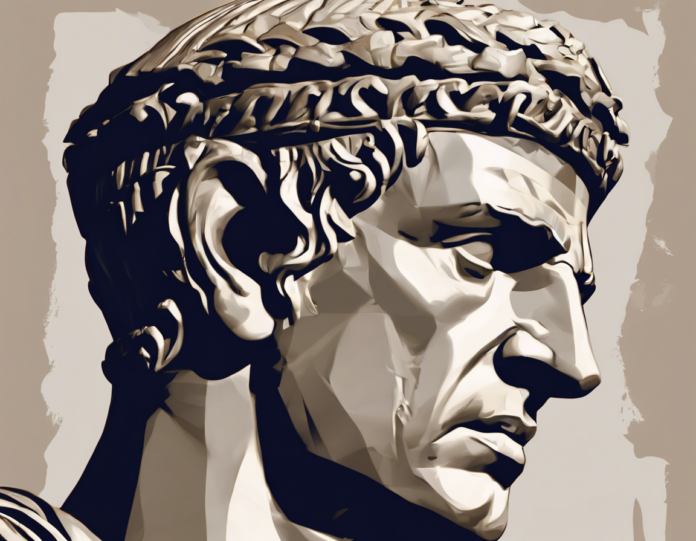As we delve into the year 2023, it is worth pausing to reflect on the fascinating figure of Mark Antony and his enduring legacy. Mark Antony was a complex and influential Roman general and politician who played a pivotal role in the transformation of the Roman Republic into the Roman Empire. His life, filled with drama, political intrigue, and military conquests, continues to captivate historians, scholars, and enthusiasts alike.
The Rise of Mark Antony
Mark Antony rose to prominence during the tumultuous period following the assassination of Julius Caesar in 44 BC. As a close ally of Caesar, he quickly emerged as one of the key figures in the power struggle that ensued. Together with Octavian (later Emperor Augustus) and Marcus Lepidus, Antony formed the Second Triumvirate in 43 BC, a political alliance that aimed to restore order to the Roman state.
The Alliance and Conflict with Octavian
While the alliance initially proved successful in defeating the forces of Caesar’s assassins, namely Brutus and Cassius, tensions soon arose between Antony and Octavian. The two ambitious leaders vied for supremacy, leading to a series of civil wars and power struggles that would shape the future of Rome. Key events such as the Battle of Actium in 31 BC, where Octavian decisively defeated Antony and his ally Cleopatra, marked the end of Antony‘s political career.
The Relationship with Cleopatra
One of the most enduring aspects of Mark Antony‘s legacy is his relationship with Cleopatra, the legendary Queen of Egypt. Their union, both political and romantic, captured the imagination of generations and has been immortalized in literature, art, and popular culture. Despite their ultimate defeat at the hands of Octavian, the Antony and Cleopatra saga remains a symbol of love, power, and tragedy.
Legacy and Impact
Although Mark Antony met a tragic end, his impact on Roman history cannot be overstated. His military campaigns in the East expanded the borders of the Roman Empire, while his political machinations laid the groundwork for the eventual transition from republic to empire. Antony‘s charisma, leadership skills, and larger-than-life persona continue to fascinate scholars and storytellers, ensuring that his legacy endures.
The Relevance of Mark Antony Today
In the modern world, the story of Mark Antony continues to resonate for a variety of reasons. His journey from a promising young general to a fallen statesman serves as a cautionary tale about the perils of unchecked ambition and political intrigue. Moreover, his complex relationship with Cleopatra raises questions about power, love, and the intersection of personal and political motivations.
Key Takeaways
- Mark Antony was a prominent Roman general and politician during the transition from the Roman Republic to the Roman Empire.
- His alliance with Octavian and subsequent conflict shaped the course of Roman history.
- Antony‘s relationship with Cleopatra remains one of the most enduring and enigmatic stories of the ancient world.
- His legacy as a military leader, statesman, and romantic figure continues to fascinate and inspire.
Frequently Asked Questions (FAQs)
1. What role did Mark Antony play in the fall of the Roman Republic?
Answer: Mark Antony was a key figure in the political turmoil that led to the fall of the Roman Republic. His alliance with Octavian and subsequent rivalry contributed to the erosion of republican institutions.
2. How did Mark Antony’s relationship with Cleopatra impact Roman history?
Answer: Mark Antony’s alliance with Cleopatra, the Queen of Egypt, fueled his conflict with Octavian and ultimately led to his downfall. Their union symbolized the merging of Roman and Egyptian power.
3. Why is Mark Antony’s story still relevant today?
Answer: The story of Mark Antony resonates today due to its exploration of themes such as ambition, power, and the personal consequences of political decisions. His downfall serves as a cautionary tale for leaders.
4. What were some of Mark Antony’s key military campaigns?
Answer: Mark Antony was known for his military campaigns in the Eastern provinces of the Roman Empire, including his campaigns against the Parthians and his support for Cleopatra in her conflicts with other rulers.
5. How did Mark Antony’s defeat at the Battle of Actium impact Roman history?
Answer: Mark Antony’s defeat at the Battle of Actium in 31 BC marked the end of his political career and paved the way for Octavian (Augustus) to become the first Roman Emperor. The battle was a turning point in Roman history.
